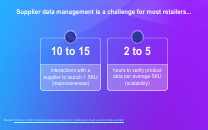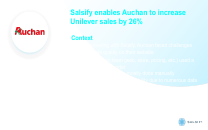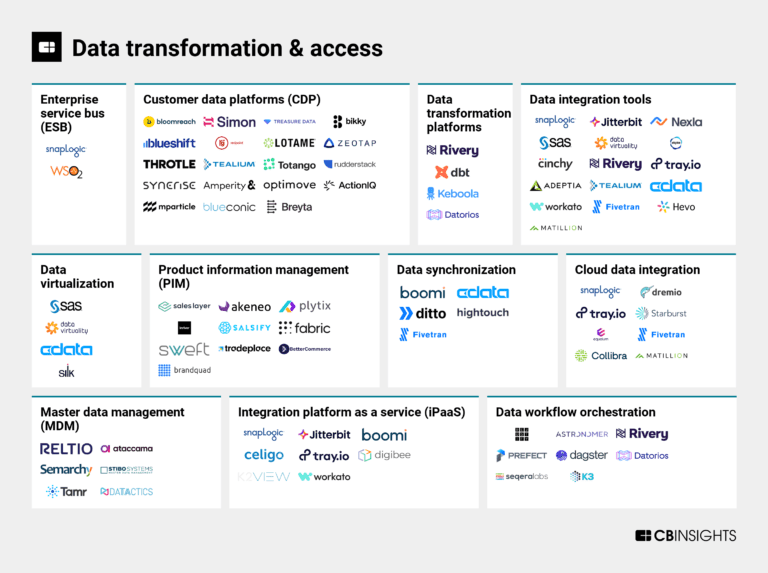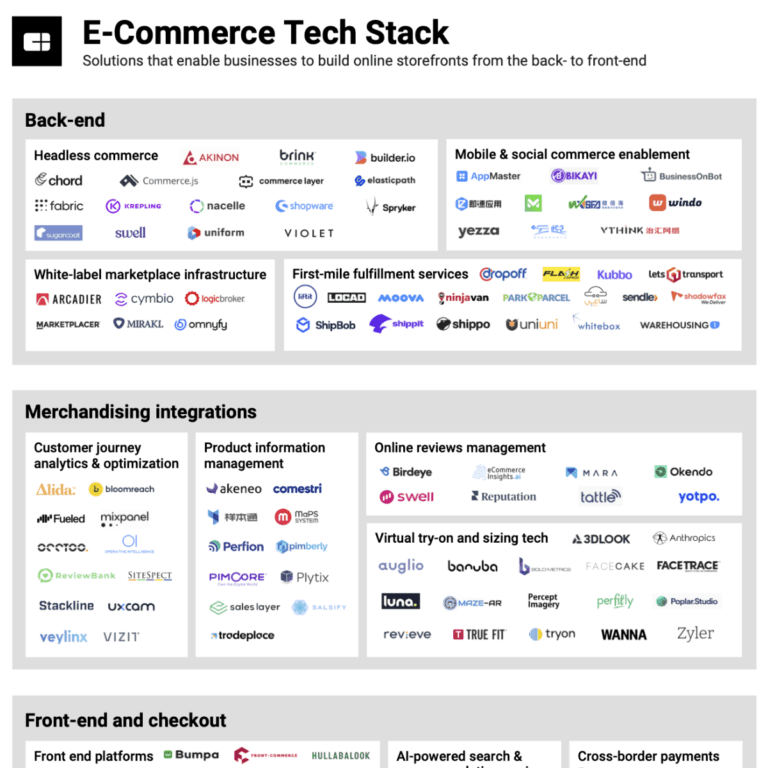
Salsify
Founded Year
2012Stage
Secondary Market | AliveTotal Raised
$452.6MRevenue
$0000Mosaic Score The Mosaic Score is an algorithm that measures the overall financial health and market potential of private companies.
-4 points in the past 30 days
About Salsify
Salsify operates in product experience management (PXM) within the digital marketing sector. It provides a platform that centralizes product information and automates content syndication. It serves brand manufacturers, distributors, and retailers. It was founded in 2012 and is based in Boston, Massachusetts.
Loading...
Salsify's Product Videos


ESPs containing Salsify
The ESP matrix leverages data and analyst insight to identify and rank leading companies in a given technology landscape.
The product information management (PIM) market centralizes, manages, and optimizes product data across multiple sales channels and touchpoints. PIM solutions offer unified repositories for product attributes, descriptions, specifications, pricing, and digital assets, enabling companies to maintain consistent and accurate data. Key features include automated data validation, workflow management, m…
Salsify named as Leader among 15 other companies, including Akeneo, insightsoftware, and SPS Commerce.
Salsify's Products & Differentiators
SupplierXM
SupplierXM allows retailers to align supplier product data collection and business processes to deliver great customer experiences. With SupplierXM, retailers’ teams can collaborate with thousands of suppliers to collect high-quality product data for different business needs and channels. All in a single and centralized platform. It empowers retailer to take 3 critical actions that are necessary to build winning Omnichannel shopping experiences: Collect the right data in an era where attributes and requirements keep constantly changing Collect data from all suppliers no matter their size, industry, country… Collect data for the right internal need, as not all data should be available at the same time and is needed by the same teams
Loading...
Research containing Salsify
Get data-driven expert analysis from the CB Insights Intelligence Unit.
CB Insights Intelligence Analysts have mentioned Salsify in 2 CB Insights research briefs, most recently on Aug 4, 2023.

Aug 4, 2023
The data transformation & access market mapExpert Collections containing Salsify
Expert Collections are analyst-curated lists that highlight the companies you need to know in the most important technology spaces.
Salsify is included in 8 Expert Collections, including E-Commerce.
E-Commerce
11,641 items
Companies that sell goods online (B2C), or enable the selling of goods online via tech solutions (B2B).
Unicorns- Billion Dollar Startups
1,297 items
Market Research & Consumer Insights
734 items
This collection is comprised of companies using tech to better identify emerging trends and improve product development. It also includes companies helping brands and retailers conduct market research to learn about target shoppers, like their preferences, habits, and behaviors.
Conference Exhibitors
5,302 items
Digital Content & Synthetic Media
1,771 items
The Digital Content collection includes companies that use technology to create, manage, and distribute digital content under all forms, including images, videos, audio, and text, among others.
Retail Media Networks
324 items
Tech companies helping retailers build and operate retail media networks. Includes solutions like demand-side platforms, AI-generated content, digital shelf displays, and more.
Latest Salsify News
Oct 29, 2025
Key Takeaways Over the past year, something surprising has been happening across sectors that used to reward speed over soul. From fashion to kitchenware to luxury goods, emerging brands are trading mass production for meticulous process — and they're being rewarded with loyalty , not just sales. This shift isn't about nostalgia or aesthetics. Consumers are gravitating toward brands that feel personal, rare and rooted in something deeper than convenience. Craftsmanship, once a niche differentiator, has become a modern business strategy . Here's why it's paying off. 1. Craftsmanship makes your brand instantly trustworthy When customers encounter a new brand, their first question usually isn't “How fast can I get this?” It's “Can I trust this?” Craftsmanship answers that question before it's even asked. A product that feels hand-touched or meticulously designed signals care, integrity and long-term value. That's especially powerful in markets flooded with private-label replicas and algorithm-generated designs. Salsify's 2025 Consumer Research report found that 87% of shoppers are willing to pay more for products from brands they trust. And trust, it turns out, often starts with quality. Whether it's hand-stitched denim or heirloom cookware, consumers associate craftsmanship with transparency and pride. This type of perceived authenticity also helps small brands punch above their weight. In a saturated market, a handcrafted product cuts through noise by offering what mass production can't: a tangible sense of origin. For early-stage companies, that's a shortcut to credibility. 2. Customers will pay more for products that feel personal Craftsmanship doesn't just justify a higher price. It demands one. When customers understand the effort, tradition or artistry involved, price becomes part of the story. That's exactly how brands like Rùadh have carved out space in the crowded fashion industry. Launched with just 11 pieces, Rùadh's debut collection focused on slow production, regenerative cotton and hand-finished details. The strategy worked — not by scaling quickly, but by resonating deeply. Customers weren't just buying clothes; they were buying into a mindset of meaningful consumption. Even beyond fashion, this trend is clear. According to Market Growth Reports, 12% of all handicraft sales in 2024 were for personalized or bespoke goods. This represents a sharp rise fueled by consumers who value individual expression over standardization. This behavior isn't limited to luxury buyers. Across categories, consumers are increasingly drawn to products that reflect their identities . Whether it's a small-batch skincare line with ethically sourced ingredients or a hand-poured candle brand that highlights cultural storytelling, customization and care now rival convenience in perceived value. 3. It's not just what you make — it's how and why you make it Today's consumers are asking what your product means. Craftsmanship offers an answer that's hard to fake. Consider Boito, a brand founded in 2023 to spotlight India's tribal handwoven textiles. Rather than adapting to trend cycles, Boito leans into cultural preservation , transforming regional weaves like Bomkai and Khandua into contemporary luxury pieces. It goes beyond fashion; it's heritage storytelling. This level of intentionality is becoming a brand identity in itself. It draws in customers who want to align their purchases with their values , and it creates a deeper moat than price or convenience ever could. When your method reflects your mission, everything about the business becomes more cohesive (and more compelling). This “why” becomes a built-in filter for decisions, partnerships and messaging, making the brand more resilient to fads and more attractive to purpose-driven consumers who want their spending to reflect their values. 4. Craft fuels word-of-mouth better than any campaign When you create something exceptional, customers become your marketers That's not just a romantic idea; it's a practical one. Products with distinct, handcrafted details naturally spark conversation. They photograph well. They carry stories. And they invite others to ask, “Where did you get that?” Word-of-mouth remains one of the most trusted forms of marketing. According to Nielsen, 92% of consumers trust recommendations from people they know over any form of advertising. Craftsmanship gives them something worth talking about. This kind of organic buzz boosts awareness and builds credibility. People aren't just sharing a product; they're passing along a piece of their own taste and values. That emotional endorsement carries far more weight than paid placements or influencer shoutouts. 5. In an automated world, craftsmanship future-proofs your brand While AI and automation dominate headlines, brands that offer human-ness stand out more than ever. Craftsmanship is the antithesis of scale-for-scale's sake. It resists disposability. It builds long-term brand equity. And there's evidence it's not going away. A report from Future Market Insights projects the global handicrafts market to grow at a 10.5% CAGR through 2035 , led by demand for eco-friendly, story-rich products that machines can't replicate. In this context, craftsmanship isn't old-fashioned. It's future-ready. The brands that embrace it aren't just making things. They're making meaning. Ultimately, craftsmanship isn't a luxury reserved for heritage houses or slow fashion obsessives. It's a modern tool for founders who want to differentiate , resonate and build something that lasts. Whether you're launching a new product or recalibrating your brand's identity, investing in craft isn't a step backward. It's a leap forward into a business model built on trust, meaning and staying power.
Salsify Frequently Asked Questions (FAQ)
When was Salsify founded?
Salsify was founded in 2012.
Where is Salsify's headquarters?
Salsify's headquarters is located at 101 Federal Street, Boston.
What is Salsify's latest funding round?
Salsify's latest funding round is Secondary Market.
How much did Salsify raise?
Salsify raised a total of $452.6M.
Who are the investors of Salsify?
Investors of Salsify include CrossWork, Permira, TPG, Cap Table Coalition, Neuberger Berman and 11 more.
Who are Salsify's competitors?
Competitors of Salsify include Makersite, CareNexis, Workflow Labs, Pimberly, Lily AI and 7 more.
What products does Salsify offer?
Salsify's products include SupplierXM.
Loading...
Compare Salsify to Competitors

Akeneo focuses on product information management. It offers a cloud-based solution that normalizes, enriches, and categorizes product data, aiming to enhance product experiences and drive customer conversion, primarily serving the e-commerce industry, with a particular emphasis on brands, manufacturers, distributors, and retailers. The company was founded in 2013 and is based in Nantes, France.

Productsup operates as a product-to-consumer (P2C) platform specializing in e-commerce and digital marketing. The company offers a suite of products that manage and optimize product content for brands, retailers, and marketplaces, ensuring it is tailored for every channel and target audience. Its services include feed management, data syndication, and performance analytics to facilitate effective product content journeys and enhance e-commerce operations. It was founded in 2010 and is based in Berlin, Germany.

Inriver is a company that specializes in Product Information Management (PIM) software, operating within the technology and digital commerce sectors. Their offerings include a platform for managing product data and facilitating omnichannel distribution, while ensuring compliance with sustainability standards. The company serves B2B and B2C enterprises. It was founded in 2007 and is based in Malmo, Sweden.

Sales Layer provides product information management (PIM) solutions within the B2B sector. The company offers a platform for centralizing, managing, and syndicating product information across various distribution channels, ensuring data consistency and real-time updates. Sales Layer's services cater primarily to B2B companies seeking to optimize their product management processes and enhance their multichannel marketing strategies. It was founded in 2013 and is based in Valencia, Spain.

Plytix provides Product Information Management (PIM) and Digital Asset Management (DAM) within the marketing technology sector. The company offers tools for businesses to store, manage, and syndicate product information and digital assets across various sales channels. Plytix's platform includes features like product description generation, catalog creation, and analytics. It was founded in 2014 and is based in Nordborg, Denmark.

Digital Wave Technology specializes in artificial intelligence (AI) powered omnichannel platforms for the retail and consumer goods sectors. The company offers solutions including product experience management, product information management, digital asset management, and master data management. It was founded in 2021 and is based in Ponte Vedra Beach, Florida.
Loading...

